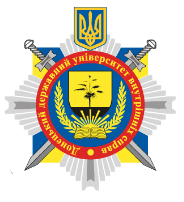PENALIZATION OF ILLEGAL INTERFERENCE IN THE OPERATION OF THE AUTOMATED COURT DOCUMENT SYSTEM IN UKRAINE
DOI:
https://doi.org/10.32366/2709-9261-2021-2-2-150-160Keywords:
penalization; criminal offense; criminal law; automated court document management system; illegal interference; justice; subject.Abstract
In the article the authors consider the institute of penalization in general and penalization of illegal interference in the work of the automated document management system of the court in Ukraine in particular. It is indicated that the study of sanctions of criminal law, and in particular Art. 376-1 of the Criminal Code of Ukraine, which provides for criminal liability for unlawful interference in the automated document management system of the court, allows us to conclude that the legislator does not always correctly correlate the public danger of an illegal act, its consequences for the state and society. According to the author, the concept of penalization is somewhat narrower than penalization. This can be explained by the fact that criminal law, despite all its humanity, is an instrument, first of all, punitive, and only then educational influence. In most cases, correction is achieved through punishment in its purest form. That is why the measures and means of alternative work with a criminal offender, which consists in release from punishment are very limited. Therefore, depenalization is a mirror image of penalization, in its narrower sense. The author's definition of penalization is offered, which should be understood as a component of criminal law policy, which is a set of mutually agreed principles, laid down in the content of punishment and implemented in the form of sanctions of the Special Part of criminal law. It is concluded that currently the types of penalties provided for illegal interference in the work of the automated document management system of the court are not fully effective and do not correspond to the level of public danger of the act. An important way of development for the legislator is to change the approach to the subjects of such an offense and to establish the features of its commission, all the necessary components of the subjective side of the criminal offense. Currently, one of the effective ways to solve this situation is to differentiate criminal liability depending on the type of subject (general or special).
References
Гуторова Н. О., Пономаренко Ю. А. Пеналізація злочинів як напрямок кримінально-правової політики. Вісник Асоціації кримінального права України. 2013. № 1. С. 32–49.
Дагель П. С. Проблемы советской уголовной политики. Владивосток : Изд-во Дальневост. ун-та, 1982. 124 с.
Панченко П. Н. Советская уголовная политика. Общетеоретическая концепция борьбы с преступностью: ее становление и предмет. Томск : Изд-во Томск. ун-та, 1988. 198 с.
Босхолов С. С. Основы уголовной политики. Конституционный, криминологический, уголовно-правовой и информационный аспекты. М. : ЮрИнфоР, 1999. 293 с.
Уголовное право. Общая часть : учебник / Л. Д. Гаухман, М. П. Журавлёв, И. Д. Козочкин и др.; под ред. Л. Д. Гаухмана и С. В. Максимова. М. : Эксмо, 2004. 784 с.
Назимко Є. С. Загальний огляд політико-правових процесів установлення міри покарання в кримінально-правових санкціях. Бюлетень Міністерства юстиції України. 2012. № 1. С. 67–72.
Литвак О. М. Про кримінальну або кримінологічну політику. Юридичний вісник Одеської національної юридичної академії. 2000. № 2. С. 94–97.
Великий тлумачний словник української мови / уклад. і голов. ред. В. Т. Бусел. К.; Ірпінь : ВТФ «Перун», 2007. 1736 с.
Коробеев А. И. Советская уголовно-правовая политика: проблемы криминализации и пенализации. Владивосток : Изд-во Дальневосточного университета, 1987. 267 с.
Кос О. Д. Завдання та роль політики у сфері боротьби зі злочинністю як напрямку діяльності держави. Право і суспільство. 2009. № 5. С. 100–102.
Ванчак М. Л. Поняття кримінальної законотворчості. Науковий вісник Львівського державного університету внутрішніх справ. Серія юридична. 2011. № 2. С. 258–266.
Павлик Л. В. Співвідношення диференціації кримінальної відповідальності з індивідуалізацією, криміналізацією та пеналізацією. Науковий вісник Львівського державного університету внутрішніх справ. Серія юридична. 2011. № 2. С. 316–326.
Пономаренко Ю. Основні правила пеналізації окремих злочинів за чинним КК України. Вісник Національної академії прокуратури України. 2009. № 3. С. 47–52.
Бершов Г. Є. Покарання за втручання у діяльність судових органів. Вісник Харківського національного університету внутрішніх справ. 2012. № 4 (59). Ч. 1. С. 83–90.
Похмелкин В. В. Социальная справедливость и уголовная ответственность. Красноярск : Изд-во Краснояр. ун-та, 1990. 177 с.
Митрофанов А. А. Основні напрямки кримінально-правової політики в Україні: формування та реалізація. О. : Вид-во Одес. юрид. ін-ту НУВС, 2004. 132 с.
Фельдштейн С. Г. Психологические основы и юридические конструкции форм виновности в уголовном праве. М. : Тип. Яцкова, 1903. 267 с.
Козаченко И. Я. Личностный аспект уголовной ответственности. Актуальные проблемы правовой защиты личности в уголовном судопроизводстве. Ярославль : Изд-во Яросл. гос. ун-та, 1990. С. 92–98.
Навроцький В. О. Значення санкції в статті кримінального закону для кваліфікації діяння. Вісник Академії правових наук України. 1999. № 3. С. 117–125.





